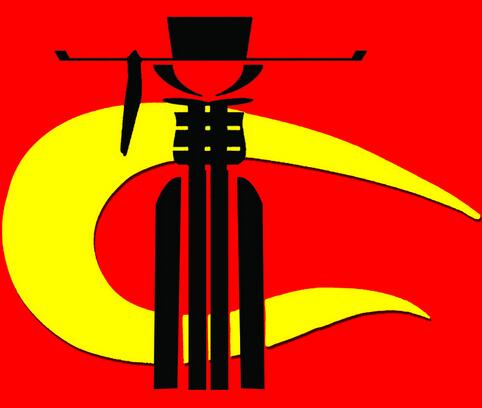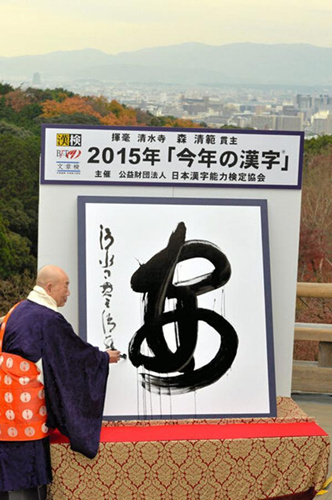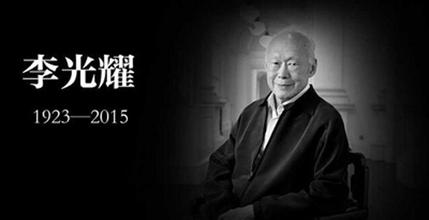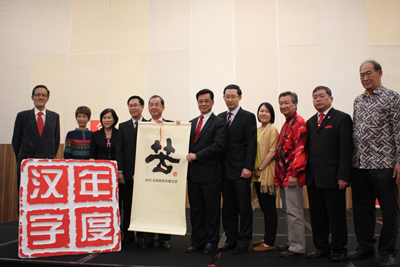(单词翻译:单击)
The Chinese character "Lian", or "clean governance," has been chosen by Chinese netizens as the character of the year 2015, and "Internet Plus" as the word/phrase of the year.
通过网友票选,“廉”字当选为2015年度中国汉字,“互联网+”成为年度中国词汇。

The winners were chosen after an online poll from more than 11,000 candidate characters and words recommended by Internet users, the selection's co-organizers -- the Chinese National Language Monitoring and Research Center and the Commercial Press announced on Monday.
该评选主办单位商务印书馆和国家语言资源监测与研究中心表示,年度字词是从网友推荐的1.1万多个字词中经过在线投票选出来的。
Also, the character "Kong," (terror) and the word "counterterrorism" were chosen as representative of international affairs.
国际方面,“恐”“反恐”分别当选年度字、词。
Runners-up included "slump," "second child," "chaotic" and "Islamic State" ISIL or Daesh, with "smog", "Belt and Road" and "refugee" also popular candidates.
今年的候选名单中,“跌”、“二孩”、“乱”、“伊斯兰国”、“一带一路”以及“难民”等字词也相当热门。
Last year's character and word/phrase were "law" and "anticorruption."
去年的年度字、词分别为“法”和“反腐”。
In several Asian countries where Chinese characters are widely used, such as Malaysia,Japan and Singapore, people have been voting for the most representative characters of the year in recent years. The polls, normally organized by academics or the media, are an interesting way of determining which events or incidents have affected the people most in a calendar year.
近几年,马来西亚、日本和新加坡等广泛使用汉字的亚洲国家每年都会投票选出最能代表这一年的汉字。这些投票通常由学术机构或媒体举办,从中能看出这一年中对人们影响最大的活动或事件,不失为一种有趣的视角。
Japan
日本
Japan Kanji Aptitude Testing Association announced at Kiyomizu Temple of Kyoto on Tuesday that安(pronounced an) or "safety" was selected as the kanji of 2015 which best summarizes the year's national mood in the country. It won 5,632 of the 129,647 votes received in total.
15日,日本汉字能力鉴定协会在京都清水寺宣布“安”当选为2015年度汉字,这一汉字最为贴切地概括了这个国家的国民这一年度的心情。“安”在129647总票数中赢得了5632张。

According to Japanese local media, the Abe administration forced controversial security-related bills through the upper house of the parliament since September despite strong protests from the Japanese people. People are concerned about safety issues as the risks of Japan being involved in a war have been obviously increased.
据日本当地媒体报道,安倍政府自9月以来不顾日本人民的强烈反对,经国会参议院通过强行推出备受争议的安保法案。由于日本卷入一场战争的风险明显增加,人们很担心安全问题。
Japanese Defence Secretary Gen Nakatani told Japanese journalists at a press conference on Tuesday that it shows Japanese people are eager for the "safety" of the future. "In addition to the concern over the new security bill, Japanese people hope to acquire safety and stability in both politics and economy," he said.
在当天的一场媒体发布会上,日本防卫大臣中谷元告诉在场的日本记者,这表明了日本人民对未来“安全”的渴求。他说道:“除了对于新安全法案的关注,日本人民还希望在政治和经济方面都能获得安全与稳定。”
爆(soar)was next only to "safety" with 4,929 votes. The phrase爆买(Bakugai or explosive buying)frequently appears on Japanese media during the whole year as busloads of Chinese travelers arrived at duty-free stores in the shopping districts throughout Japan, purchasing items including rice cookers and high-tech toilet seats.
“爆”字以4929票紧随“安”之后。随着一车车的中国游客抵达日本各个购物地区的免税店,购买包括电饭煲与高科技马桶座圈在内的各种物品,整整一年中,“爆买”一词频繁出现在日本媒体中。
战(war),结(marriage),五(five),赏(reward),伪(fake),争(dispute),变(change) and 胜(win) were also listed as the top 10 kanji for the year in Japan.
“战”、“结”、“五”、“赏”、“伪”、“争”、“变”和“胜”也入选日本十大年度汉字。
The annual kanji selection event has been held since 1995. Last year,税or "tax" was chosen the annual kanji as the consumption tax rate was raised from 5 percent to 8 percent.
日本年度汉字评选活动始于1995年。去年,“税”字被选作年度汉字,原因是消费税率从5%提高到了8%。
Singapore
新加坡
In Singapore, Lianhe Zaobao published the result of the 2015 Chinese character poll on Monday.耀(pronounced yew), which has several connotations including radiance, brilliance and glorious, was chosen as the Chinese character of the year. It is also the last character in former Singapore Prime Minister Lee Kuan Yew's Chinese name.
在新加坡,《联合早报》于14日发布了2015汉字投票的结果。“耀”字当选为这一年的年度汉字。它有好几层含义,包括发光、光辉和辉煌。同时,它也是新加坡前总理李光耀中文名的最后一个字。

Goh Sin Teck, editor-in-chief of Lianhe Zaobao, stressed that 2015 has been an especially eventful year for the media, from natural disasters to the passing of a great man, as well as various local and international news events that hold great significance both politically and historically.
《联合早报》的主编吴新迪强调说,2015年对于媒体而言是一个不同寻常的多事之年,从自然灾害到伟人的陨落,还有各种在政治和历史层面上都有重大意义的本地及国际新闻事件。
"Although this character can be linked to various news events, the news that will first come to people's mind would still be the passing of our founding Prime Minister Mr Lee Kuan Yew. This shows that when readers look back at the major events of the year, the one that leaves the deepest impression is our shared memories of the seven days (of mourning) in March," he said.
他说:“虽然这个汉字可以跟不少新闻事件联系起来,但是人们第一时间想起的仍是我们国家的奠基者李光耀先生。这表明,当读者们回首这一年的主要事件时,我们印象最为深刻的是我们对于三月那七天时间(哀悼日)的共同记忆。”
Lee, who was Prime Minister from 1959 to 1990 and died in March aged 91, received a hero's funeral after an unprecedented outpouring of grief from Singaporeans who now enjoy one of Asia's highest standards of living.
李光耀在1959年到1990年期间担任新加坡总理,于今年3月去世,享年91岁。全体新加坡人用前所未有的方式表达了对他逝去的悲痛之后,又为他举行了一场英雄的葬礼。如今,新加坡人民的生活水平在亚洲是最高的。
Cooperating with 10 experts, the editorial team of Lianhe Zaobao also concluded 民(citizenry),国(nation),惊(surprise or shock),难(difficulty),信(trust),责(responsibility),新(afresh/renew),毒(noxious) and汇(currency) as the top 10 Chinese characters after a two-week poll.
汉字评选投票为期两周,编辑团队与10位专家把“民”、“国”、“惊”、“难”、“信”、“责”、“新”、“毒”和“汇”列为十大年度汉字。
Lianhe Zaobao held the annual Chinese character of the year poll since 2011. Last year, the annual character was乱which means disorder or chaos.
《联合早报》从2011年开始举办年度汉字评选活动。去年当选的汉字是“乱”,意为混乱或骚乱。
Malaysia
马来西亚
In the annual selection of Chinese characters jointly conducted by the Federation of Chinese Associations Malaysia (FCAM) and Han Culture Centre Malaysia (HCCM),苦(pronounced ku)or bitter was chosen as the Chinese character of 2015 in Malaysia.
马来西亚一年一度的年度汉字评选由马来西亚中华大会堂和马来西亚汉文化中心共同举办。今年,“苦”被选为马来西亚2015年的年度汉字。

According to Xinhua News Agency, 14,078 Malaysians from 65 countries and areas participated in the poll, the largest number of participants in history, and some 16% of them had chosen the word“bitter”. Around 15% of the participants chose the word贪(conrruption) and 14% of them chose 税(tax).
据新华社消息,来自65个国家和地区的14078位马来西亚籍人士参加了这次投票,参与人数为历史最高。其中,“苦”字以16%左右的最高投票率当选,约有15%的人选择了“贪”字,而14%的人选择了“税”字。
In addition,捐(donation),乱(unrest),跌(crash),耻(shame),霾(smog),一(one) and 震(quake) were also listed as the top 10 Chinese characters for the year in Malaysia.
此外,“捐”、“乱”、“跌”、“耻”、“霾”、“一”和“震”入选马西亚年度十大汉字。
President of FCAM Fang Tianxing announced the result last Friday. He said that the top 10 Chinese characters showed the public dissatisfaction with the new consumption tax policy, soaring commodity prices and the depreciation of the Malaysian ringgit.
马来西亚中华大会堂总会长方天兴在11日揭晓了这一结果。他说,这十个汉字显示了公众对于新消费税政策、不断上涨的商品价格以及林吉特(马来西亚货币单位)贬值的不满。
Malaysia started the annual Chinese character selection since 2011. In 2014,贪(corruption),马(abbreviation of Malaysia),失(lost) ,涨(inflation) ,难(tough),航(flight),苦(bitter),愁(worry),税(tax) and迷(puzzle) were chosen as the Chinese characters of the year in the country.
马来西亚从2011年开始一年一度的汉字评选。2014年,“贪”、“马”、“失”、“涨”、“难”、 “航”、“苦”、“愁”、“税”和“迷”被选为马来西亚年度十大汉字。


